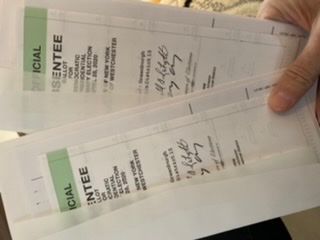Missing Ballots
-
@jon-nyc said in Missing Ballots:
How many printed ballots went missing in those 4 elections?
No idea. Do you think it was one in five?
Also (cough) "some areas in the country, notably Chicago, did not respond to the federal agency’s survey questions."
-
In the general elections, voter turnout rates average about 60% in recent history.
If among the vote-by-mail ballots, only 20% are "missing," that means 80% of the vote-by-mail ballots have been mailed back and accounted for. That's already 20 percentage points better than the 60% overall participation rate. This shows that vote-by-mail yields higher participation rate, and we should expand access to vote-by-mail. -
In the general elections, voter turnout rates average about 60% in recent history.
If among the vote-by-mail ballots, only 20% are "missing," that means 80% of the vote-by-mail ballots have been mailed back and accounted for. That's already 20 percentage points better than the 60% overall participation rate. This shows that vote-by-mail yields higher participation rate, and we should expand access to vote-by-mail.@Axtremus I'm sure you can figure out the fallacy in that.
-
@Ivorythumper even if you dispute that specific line of reasoning I put forth, there are no lack of carefully done studies and analyses that show that vote-by-mail increases voter turnout.
One point I want to emphasize is this: it is normal for vote-by-mail voters to not return some of the ballots. As much as I prefer mandatory voting, abstention from voting is still legal and (in may opinion) too commonly practiced by voters in the USA. As such, it is reasonable to expect some vote-by-mail voters to abstain. In that light, a 20% "missing" vote-by-mail ballots is not only not alarming, but a significant improvement in a world where generally 40% of voters abstain.
-
If they're counting non-returned ballots as 'missing', 1 in 5 is really, really good.
-
@Ivorythumper even if you dispute that specific line of reasoning I put forth, there are no lack of carefully done studies and analyses that show that vote-by-mail increases voter turnout.
One point I want to emphasize is this: it is normal for vote-by-mail voters to not return some of the ballots. As much as I prefer mandatory voting, abstention from voting is still legal and (in may opinion) too commonly practiced by voters in the USA. As such, it is reasonable to expect some vote-by-mail voters to abstain. In that light, a 20% "missing" vote-by-mail ballots is not only not alarming, but a significant improvement in a world where generally 40% of voters abstain.
@Axtremus said in Missing Ballots:
@Ivorythumper even if you dispute that specific line of reasoning I put forth, there are no lack of carefully done studies and analyses that show that vote-by-mail increases voter turnout.
One point I want to emphasize is this: it is normal for vote-by-mail voters to not return some of the ballots. As much as I prefer mandatory voting, abstention from voting is still legal and (in may opinion) too commonly practiced by voters in the USA. As such, it is reasonable to expect some vote-by-mail voters to abstain. In that light, a 20% "missing" vote-by-mail ballots is not only not alarming, but a significant improvement in a world where generally 40% of voters abstain.
The notion that "missing ballots" were never returned (and therefore effectively abstentions) is a better point.
But the primary issue here is not the percent of voter particaptoin, but the integrity of the system. Consider:
High voter participation is better for a democratic republic, since it promotes a better argument for a mandate, and engages more of the citizens in the political process. But this is contingent on the system itself being above reproach -- that all citizens have equal access to the voting process and that all votes are counted fairly.
Lower voter participation is not optimal for a democratic republic because it does not involve the populace in the political process, but it is not strictly necessary if there were a country where everyone was satisfied with the way the country was being governed. A lower voter participation does not call into question the integrity of the system itself.
From this it seems that the most important value in any political process is the integrity of the system itself: so ANYTHING that erodes confidence in the system, or is susceptible to abuse or fraud, is to be rejected. This would include voter intimidation at the polls, voting machines that can be compromised, lack of voter verification and validation, failures to have chain of custody for ballots to be counted, etc.
We obviously have the mechanisms to solve for all these -- I prefer the Indian method where the voter uses their thumb in ink on election day -- such that they can only vote once and they have authorized the ballot with their identifiable fingerprint (with some other similar mechanism for those who don't have thumbs).
We could do this with SSN and voter ID and photo documentation, which is held secret unless the verification shows more than one user, at which point the case is investigated for fraud with extremely harsh penalties for the criminals.
We can easily do all this -- but political forces are obstructing the path to ensuring the integrity of the system.
